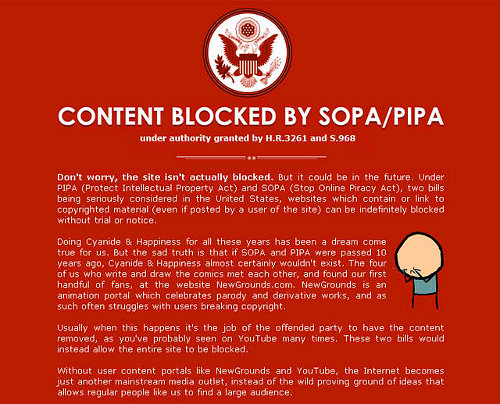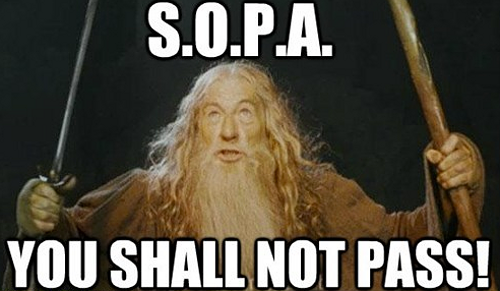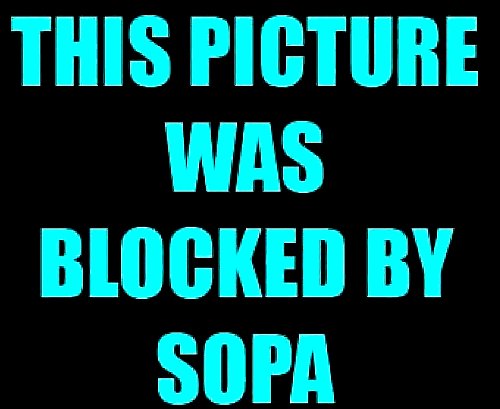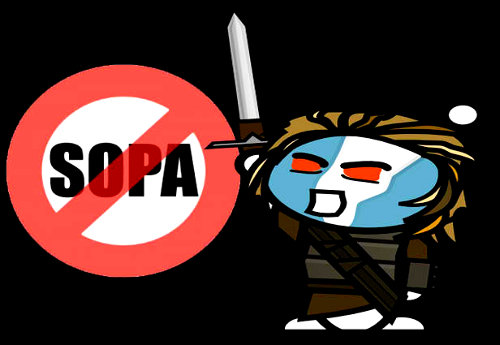SOPA: A Pox on Both Houses
By Ron Steinman
 The earlier fuss over SOPA, the “Stop Online Piracy Act,” is now mostly quiet. Each side in this epic battle of who controls the Internet is rethinking its strategy. Lobbyists are garnering big fees as they freely give advice on what they believe will be a winning scheme. The story is off the front pages and no longer an item on TV newscasts. Talk radio is ignoring SOPA for the moment. Newspapers and news sites or instead filled with politics and the race for the Republican nomination.
The earlier fuss over SOPA, the “Stop Online Piracy Act,” is now mostly quiet. Each side in this epic battle of who controls the Internet is rethinking its strategy. Lobbyists are garnering big fees as they freely give advice on what they believe will be a winning scheme. The story is off the front pages and no longer an item on TV newscasts. Talk radio is ignoring SOPA for the moment. Newspapers and news sites or instead filled with politics and the race for the Republican nomination.
Let me get something straight about the fight over SOPA. It is not about who controls the Internet, big or small on the WEB, or big or small in the burgeoning world of entertainment… It is, simply, he who controls the WEB controls the world.
 The battle in the world of media is about control, and, ultimately, ownership. Who owns the right to what others or I create is the issue, rather than the idea that everything on the WEB is free and therefore for the taking without due compensation. Consider this column a message to advocates of the open Internet as they plead for the continuation of anarchy in cyberspace. Consider, too, this column a message about the world of entertainment and its desire to put brakes on information and how that information flows on the WEB. Remember, he who controls the Web controls the world.
The battle in the world of media is about control, and, ultimately, ownership. Who owns the right to what others or I create is the issue, rather than the idea that everything on the WEB is free and therefore for the taking without due compensation. Consider this column a message to advocates of the open Internet as they plead for the continuation of anarchy in cyberspace. Consider, too, this column a message about the world of entertainment and its desire to put brakes on information and how that information flows on the WEB. Remember, he who controls the Web controls the world.
This does not means we should disregard the battle over SOPA while we wait for the issue to raise its head again. Congress is working on new bills that will favor which side one or the other faction supports. I say a pox on both sides because each wants to control what you read or see and use their various platforms to make money from what they learn about you- mainly from cookies and apps online, and through the many mobile platforms now available to all users.
 While all this is going on, I want to emphasize that the fight over who controls the World Wide Web for me is really about piracy. In other words, who has the right to what others or I create? Who has the power and, more often, the guts to steal what people create? What have we become as people that we believe it is okay to rip off creative material without paying for it? Is stealing really in our DNA? Piracy, and the notion that everything on the WEB is free, and up for grabs, if you will, allows the thieves, and that is most of you, who dwell in the land of the pirate to make money off the backs of the seriously imaginative community. It is a community that would like to think it can make a living from what it creates, from what comes out of its heart and head, its soul, and its sweat. Alas, it rarely does.
While all this is going on, I want to emphasize that the fight over who controls the World Wide Web for me is really about piracy. In other words, who has the right to what others or I create? Who has the power and, more often, the guts to steal what people create? What have we become as people that we believe it is okay to rip off creative material without paying for it? Is stealing really in our DNA? Piracy, and the notion that everything on the WEB is free, and up for grabs, if you will, allows the thieves, and that is most of you, who dwell in the land of the pirate to make money off the backs of the seriously imaginative community. It is a community that would like to think it can make a living from what it creates, from what comes out of its heart and head, its soul, and its sweat. Alas, it rarely does.
Understand, piracy and theft is a two way street. There is the supply side, meaning the source of the creative output. Every supplier needs a user. It is strange co-dependency. Those who steal and those who take from the thief for their own enjoyment live off each other. Unlimited aggregation rarely benefits everyone. There might be a momentary high when a writer or photographer sees his or her work displayed on various Internet platforms. Aggregation and file sharing may be pleasurable at first but it lasts only so long. Its power soon dies, though, when there is no check in the mail. There is, unfortunately, no substitute for putting food on the table or buying shoes for the baby. Fame is transitory. As with so much on the WEB, it evaporates in the maw of Cyberspace.
 Somewhere along the way, users of the Internet, again, that means everyone who uses the Internet, developed the notion that because the Internet appears to be free, no one has to pay to use it or pay for anything that is on it, or in it. This is not new, but it is now an integral part of the consciousness of WEB users, forever in place as part of their being. But does this right to steal come from the seeming anonymity of the Internet? Does being unseen allow people to believe they can, and do, safely hide in cyberspace? Similar to shoplifting, is there a thrill that people get when they steal something they think is easy to hide in one’s pocket? I have no idea why piracy online is acceptable, but, I do know that it certainly defies the notion found in the Eighth Commandant that says You Shall Not Steal.
Somewhere along the way, users of the Internet, again, that means everyone who uses the Internet, developed the notion that because the Internet appears to be free, no one has to pay to use it or pay for anything that is on it, or in it. This is not new, but it is now an integral part of the consciousness of WEB users, forever in place as part of their being. But does this right to steal come from the seeming anonymity of the Internet? Does being unseen allow people to believe they can, and do, safely hide in cyberspace? Similar to shoplifting, is there a thrill that people get when they steal something they think is easy to hide in one’s pocket? I have no idea why piracy online is acceptable, but, I do know that it certainly defies the notion found in the Eighth Commandant that says You Shall Not Steal.
Related Articles












You must be logged in to post a comment Login